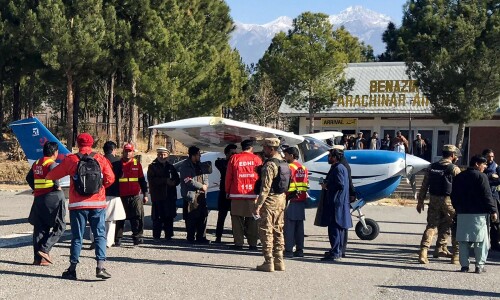
ISLAMABAD: The Supreme Court has decided to recommence hearing in an open and transparent manner the long pending petition of Air Marshal (retd) Asghar Khan about the Inter-Services Intelligence (ISI) bribing politicians. Earlier hearings on the petition were held in closed-door sessions.
As the proceedings began on Wednesday, the court expressed surprise that statements of the main characters recorded earlier during in-camera hearings were missing.
A three-judge SC bench comprising Chief Justice Iftikhar Mohammad Chaudhry, Justice Khilji Mohammad Arif and Justice Tariq Parvez which took up the case asked the court’s office to dig out from the record statements of former army chief Aslam Beg, former ISI director general Lt-Gen (retd) Asad Durrani and former interior minister late Maj-Gen (retd) Naseerullah Khan Babar and place them before the court on March 8 in a sealed envelope.
The statements were not presented by the office on Wednesday.
The office is also required to trace and submit under seal the report on the working of the ISI as was mentioned in the court order sheet of May 27, 1998.
“Let’s see what happens,” Asghar Khan said when asked by Dawn what he expected from the proceedings. It had been quite a long time, he added.
In 1996, Asghar Khan, who had formed Tehrik-i-Istiqlal, had filed the constitutional petition in the Supreme Court requesting it to look into allegations that the ISI had financed several politicians during the 1990 elections to create the Islami Jamhoori Ittehad (IJI) and prevent Benazir Bhutto’s PPP from winning. The ISI had allegedly dished out Rs140 million for the purpose.
In response to the petition, Lt-Gen Asad Durrani submitted an affidavit in the court, giving details of the amount he had authorised to be paid among politicians allegedly on the directive of former army chief Aslam Beg.
According to the affidavit, former prime minister Nawaz Sharif was given Rs3.5 million, Mir Afzal Khan Rs10 million, Lt-Gen Rafaqat Rs5.6 million for distribution among journalists, Abida Hussain Rs1 million, Jamaat-i-Islami Rs5 million, Altaf Hussain Qureshi Rs500,000, Ghulam Mustafa Jatoi Rs5 million, Jam Sadiq Rs5 million, Junejo Rs250,000, Pir Pagara Rs2 million, Maulana Salahuddin Rs300,000, Humayun Marri (Bugti’s son-in-law) Rs1.5 million, Jamali Rs4 million, Kakar Rs1 million, K.
Baloch Rs0.5 million, Jam Yousuf Rs0.75 million, Bizenjo Rs0.5 million and Nader Mengal Rs1 million.
Advocate Salman Akram Raja, the counsel for Asghar Khan, informed the court that Rs60 million had also been given to the ‘K fund’ and Rs20 million to the Directorate of External and Operations of the ISI.
“Actually the complaint of the petitioner invited the attention of the entire nation; he acted pro bono,” the chief justice observed. He said the man on whose affidavit the issue cropped up was not an ordinary person and his confession could be used against him.
The court asked the attorney general’s office to issue a notice to Asad Durrani because the earlier one issued by the court office had been returned un-served. The court issued fresh notices to the defence secretary and Advocate-on-Record Raja Abdul Ghafoor when Attorney General Maulvi Anwarul Haq informed it that no official from the defence ministry had so far approached him.
While perusing the record, the bench noted that a letter written to the court registrar on June 25, 1998, had mentioned that the defence ministry and the ISI DG were party to the proceedings.
The court also issued notice to Younus Habib, the chief of now defunct Mehran Bank, who had provided the Rs140 million for the IJI though he was not a party to the earlier proceedings.
Salman Raja read out a letter written by his client to then chief justice Sajjad Ali Shah and the petition and said the conduct reflected gross misconduct because the armed forces were brought into disrepute and their discipline was undermined.
“This also amounted to subversion of the democratic system as people have every right to have a clean democratic process and want to know whether their votes attached any sanctity,” the counsel argued.
The previous record of the case also suggested that the government had on January 1996 appointed a three-member commission headed by then judge Justice Mohammad Munir Khan to investigate the source of funds and the method adopted for depositing these in different accounts of an intelligence agency by Younus Habib and involvement of other individuals, holders of the public office, politicians and government servants.












































Dear visitor, the comments section is undergoing an overhaul and will return soon.